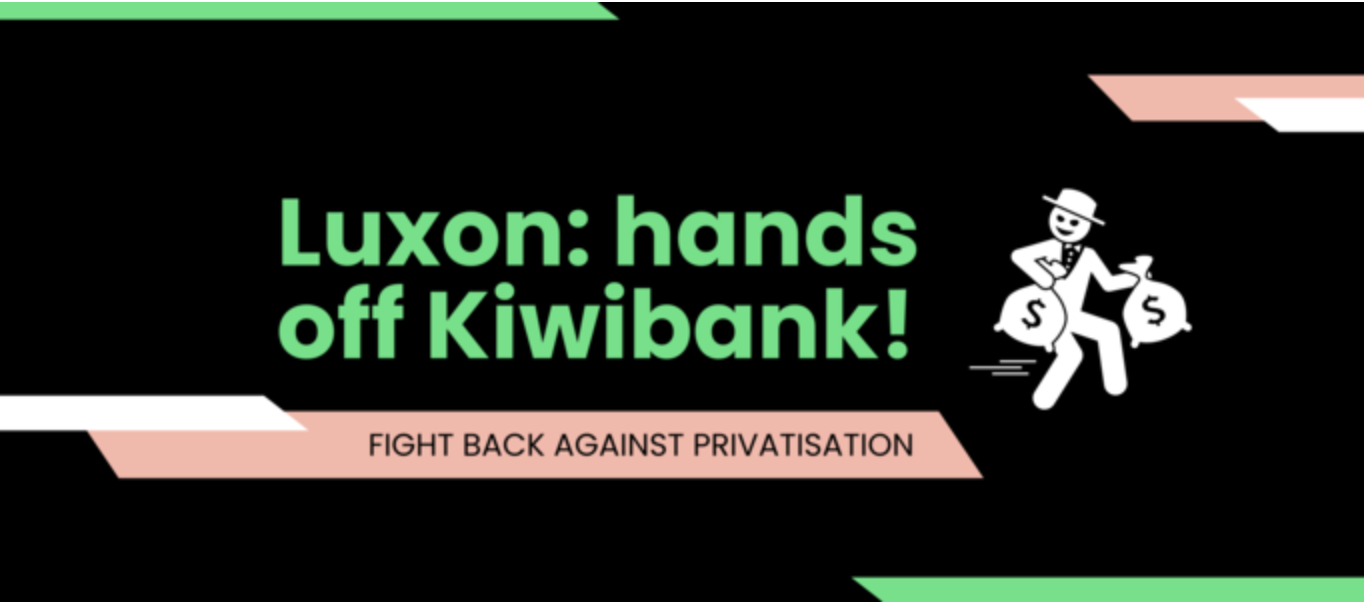Opinion by Hon. Matt Robson, former Alliance Party Cabinet Minister and Associate Minister of Foreign Affairs.

In 2000, the Initial vote on Kiwibank in the Labour-Alliance government was 16 votes against from Labour, and four votes in favour from the Alliance.
I was there when this was reversed, and in 2001 the four insurgent Alliance Ministers – Jim Anderton, Sandra Lee, Laila Harre and Matt Robson- received our foundation Kiwibank cards in Jim’s office.
New Zealand once again had a popular publicly owned bank to aid its development and counter the strangling grip of the privately owned foreign banks.
Finance Minister Hon. Michael Cullen said, begrudgingly, that the bank, operating from New Zealand Post premises, would get an $ 80 million loan , but not one cent more. Helen Clark continued her opposition by announcing she would remain an Australian Big 4 customer.
Kiwibank had been a long journey.
So, why had Alliance members campaigned so long and hard for this goal?
Jim Anderton had spelt out the reason in 1988 as the Lange Labour government continued its crash sale of public assets by putting the Bank of New Zealand with its 20 percent share of the banking sector on the auction block. In a 1988 parliamentary speech that led to his expulsion from the Labour caucus Jim Anderton said:
“The sale of State Owned Enterprises transfers ownership, control, wealth and resources from the public sector to the private sector…Once it is sold the policy options available…are almost certainly removed…Even after the worst stock market crash in New Zealand’s history…the Bank of New Zealand made an operating profit of $182 million in the 1987-88 financial year… (it) is virtually a perpetual asset…(and) commands 20 percent of the current financial system.”
As a highly capitalised bank the BNZ, meeting its huge taxation and dividends obligations to the government and with its long history in the development of New Zealand as an arm of government, the BNZ limited the destructive side of private banks and kept profits and investment capacity in New Zealand.
Within a short time, an expanding Kiwibank kept local branches open, and rapidly attracted customers. It paid back the initial government capital within 3 years. It now has over one million customers, including over 40,000 businesses.
Michael Cullen, resiling from his initial hostility, was to praise Kiwibank in his autobiography as follows:
“But Kiwibank proved its real worth to New Zealand in the early stages of the global financial crisis. The Australian banks withdrew substantially from the New Zealand mortgage Market. Kiwibank stepped into the breach. Despite its very small size compared with the Aussies, it was for a year or two the largest provider of new mortgages…since Kiwibank was set up, the Australian banks have emphasised their New Zealand character…”
Michael Cullen, the former Finance Minister then warned, and Minister Willis would do well to heed, about the true character of the private banks:
“…when the crunch comes , one should never be fooled about where their primary accountability will lie.”
In his 1988 speech to Parliament, opposing his own public asset selling Labour Party, Jim Anderton also outlined the vision which in 2002 was to underpin both the Kiwibank and a newly minted ministry of economic and regional development, of the public bank playing an essential role in national economic development:
“…if it were decided to run an active regional development policy the geographical spread of the branches of the Bank of New Zealand makes the bank the only Government agency with the detailed knowledge required to act of the Government… of providing long-term development funds for viable projects in all the regions…sale of such an extensive economic power…may lead to the operation of the bank for purely financial commercial reasons…small borrowers , and even Governments, suffer when dominant banks are run for short term financial reasons and profits.”
All of these advantages are now at risk as the government , using the excuse of the need to raise capital for the bank to take on the Big 4, sets out to gift an essential economic tool to the private sector.
The New Zealand Herald revealed the government’s intentions on 25 July:
“In a routine letter of expectation sent to Kiwibank’s board chairman David McLean in April, shareholding ministers suggested they were open-minded as to how Kiwibank grew… ( Minister of State Owned Enterprises ) Goldsmith said the Government had no plans to privatise state assets, but conceded a possible outcome of the purpose statement exercise could be that it decided it no longer wanted to own an asset.”
Renationalisation Pledge
Warning bells should ring for Labour and the Greens. Labour members and voters triumphed over the initial opposition to Kiwibank of Helen Clark and Michael Cullen to Kiwibank. The Green Party has pledged to oppose asset sales. As Alliance MPs, Green Party founders Jeanette Fitzsimons and Rod Donald campaigned for Kiwibank . Labour and the Greens must form a united front in defence of Kiwibank. A pledge to re-nationalise and expand through government financing ,there are multiple financing methods available , will deter the circling sharks which include the Australian bank competitors.
Governments of all stripes throughout the world recognise the crucial developmental role of a large state bank as an essential tool for long term investment and development. Labour and the Greens can unite to build on the vision of Jim Anderton and ensure that New Zealand is not, once again, deprived of its state-owned bank by a short-sighted government acting in the narrow interests of the private sector and not in the best interests of New Zealand.
EDITOR’S NOTE: Matt Robson and others are calling on the New Zealand Government to abandon any plans to privatise Kiwibank and to commit to keeping it in public ownership.

You can sign the petition here.



